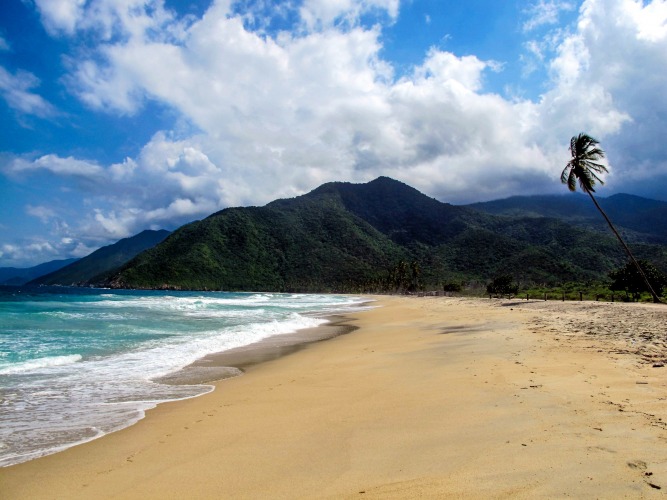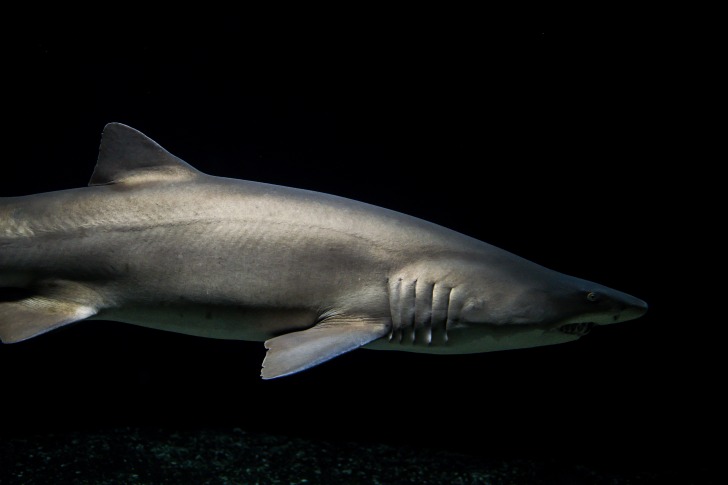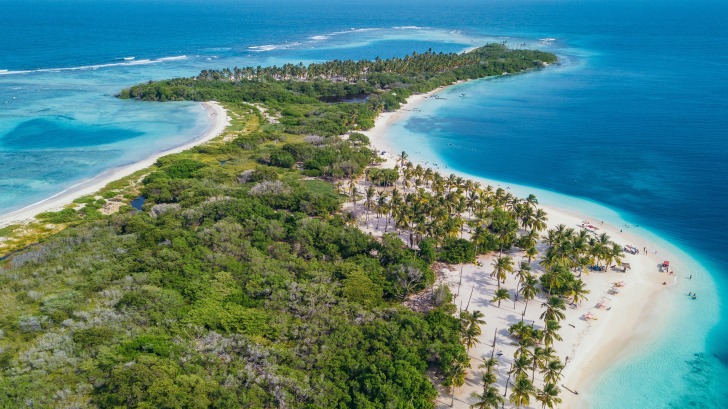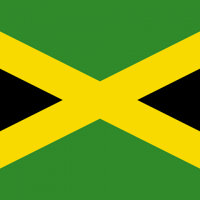Venezuela is a country located in the northern part of South America.
The country is washed by the Caribbean Sea and the Atlantic Ocean.
There are many dangerous animals that live on the land and in the ocean just off the coast of this country.
But the beaches are absolutely breathtaking and the country attracts hundreds of thousands of visitors each year that flock there to experience those beaches.
The main question we will be focusing on is whether any of those dangerous animals are sharks and what type of sharks call the ocean off the coast of Venezuela home.
Contents
So… Are There Sharks in Venezuela?
Yes, there are a lot of different shark species in Venezuela.
In fact, from 1994 to 2000, the Venezuelan longline fleet established that there was a high elasmobranch diversity in Venezuela.
There are approximately 115 different species of sharks and stingrays in the nearshore, inshore, and offshore waters of this country.
Of the observations to date, there were 66 shark species and 49 ray species.
Two of the most dangerous sharks that are present in the water just off the coast of Venezuela are the Bull Shark and the Oceanic White Tip Shark.
These sharks are known to be exceptionally aggressive and dangerous to humans.
What makes the Bull Shark even more lethal is the fact that these sharks are able to swim in fresh and brackish water.
It is not uncommon to find them upstream in freshwater rivers.
And, although attacks on humans by the Bull Shark are rare, they do happen, and many of those attacks that have been recorded have been fatal.

Below is a list of some of the more common sharks that are present off the coast of Venezuela.
One of the most popular shark species in Venezuela’s waters is the Lemon Shark.
The country has banned shark finning and the lemon shark is a protected shark in the Los Roques Archipelago off of Venezuela.
These sharks grow to about ten feet in length and pose little threat to humans.
There have only been ten recorded unprovoked attacks on humans.
The Whale Shark, a migratory, filter-feeding shark, is the largest shark in the ocean and can be found off the coast of Venezuela.
These sharks are known as gentle giants and do not attack humans or are aggressive towards humans.
Their teeth are too small to bite or chew and they only eat small fish and plankton.
The Scalloped hammerhead shark is an open-water hunter.
These sharks are hunted for their fins, meat, and hides.
They are considered to be potentially dangerous to humans and the International Shark Attack File has recorded a total of 17 attacks on humans.
None of the attacks were fatal.
The Oceanic whitetip shark has paddle-like fins that are white-tipped.
These sharks are solitary and move slowly in the upper layers of the deep ocean.
They are exceptionally dangerous sharks and are suspected of many unrecorded fatalities.
They have allegedly also attacked the survivors of plane and boat accidents in the ocean.
These sharks are caught commercially.
Their meat is consumed by humans, their fins are used in certain Asian cuisines, their hides are used to make leather merchandise and their liver oils are used for health and beauty reasons.
These sharks are distributed across different oceans and seas across the world.
The Shortfin Mako Shark is another shark that can be found in the waters of Venezuela.
These sharks are considered to be the fastest sharks in the world.
They can reach speeds of up to 43 mph in the water.
They are considered to be dangerous to humans.
To date, there have been ten recorded shark attacks on humans in history, with one of those attacks being fatal.
Their IUCN Red List Status lists them as vulnerable in certain areas of the world.
The Silky Sharks are identified by their long silky bodies.
They are potentially a threat to humans if humans enter their territory.
These sharks are in abundance in the open water.
They are commercially hunted for their meat and hide.
Is it Safe to Swim in Venezuela?
There are many beaches that are perfectly safe to swim in along the coast of Venezuela.
Many of these beaches stretch along miles and miles of white sandy beaches with crystal clear water.
Of course, there are natural factors to consider when it comes to safety.
As with any large body of water, such as an ocean or sea, there is always the risk of drowning.
Swimmers should keep an eye out for strong currents and rip tides.
Waters in the Caribbean can be especially deceptive and dangerous if you are not an experienced swimmer.
There are a host of natural disasters which may make swimming quite dangerous, such as the fact that Venezuela is situated in an earthquake-prone zone.
From May through November, the country is subjected to torrential rains which may lead to landslides.
Hurricanes may pose another threat to anyone visiting the country and thinking of going for a swim.
Swimmers are advised to always check the weather before going out.
Stay in designated swimming areas and only swim if there are active lifeguards on duty.
Interesting Shark Facts in Venezuela
Let’s start with the least dangerous, most docile, and biggest shark of them all, the Whale Shark.
These sharks are known as the genial giants of the ocean.
They are harmless to humans.
They are slow-moving, filter feeders that have very small teeth.
They cannot chew or bite and only eat small fish and plankton.
They are the largest of the shark species.
Two of the most dangerous sharks in the world can be found in Venezuela’s waters.
These include the Bull Shark and the Oceanic Whitetip Shark.
Both of these shark species are known to be very aggressive.
The lemon shark is the most researched of all sharks and the most well-known shark.
These sharks are named for their unusual pigment and color.
They are usually found in the coastal regions of the Pacific and Atlantic Oceans in tropical and subtropical waters.
These sharks have electro receptors that allow them to hunt their prey.
All living animals and sea creatures emit electric impulses.
They also have extremely bad sight and usually hunt using other senses like their magnetic senses.
The most interesting fact about these sharks and all other species of sharks is that sharks never sleep.
They are unable to sleep as they need to move to be able to breathe.
Their movement might come down to a very slow crawl but they never actually fully fall asleep.
They go into a trance-like state in order to get some form of sleep.
Unlike bony fish, sharks do not have any bones. Instead, they have cartilaginous skeletons in their bodies.
This allows them to move swiftly and turn at a moment’s notice while swimming in the ocean.
This also makes them very light.
It’s their structure and their large livers that contain low-density oils that allow these sharks to be so buoyant in saltwater.
Most species of sharks can be found in saltwater, but there are some shark species that also live in freshwater.
According to some research conducted on the behavior and living conditions of sharks and different shark species, many sharks prefer saltwater to freshwater because they are unable to stay afloat in freshwater and they are unable to extract the salt that their bodies need from freshwater.
Sharks tend to be less buoyant in freshwater.
Sharks do not have a swim bladder.
This is a gas-filled organ found in most bony fish that helps them to float.
Sharks do, however, have large livers which help to prevent them from sinking to the bottom of the ocean.
Sharks that have adapted to living or at least being able to swim in freshwater, have much larger livers that help them to be buoyant in freshwater.
Sharks are salty and need salt water in order to stay alive.
They process the water through their bodies and retain the salt.
Without it, their cells will rupture, which will cause them to bloat, and eventually die.

3 Safety Tips for Swiming in Shark-infested Waters
- Avoid shark-infested water at specific times of the day. These are the times that sharks are known to be feeding, which include dusk, dawn, and at night. Swimming in shark-infested waters during this time poses a great risk to your overall safety. It is best to stay out of rivers and the ocean that host any species of sharks. This is especially true with sharks, which are known to be dangerous to humans.
- Stay out of the water if you are actively bleeding. Sharks have a very keen sense of smell. They can smell blood in the water from hundreds of yards away. Their sense of smell is so good that they are able to distinguish between fish and human blood.
- Never go swimming alone. Always swim with other people in the areas that have lifeguards. In addition, try not to swim at the edge of the group. And, do not splash or make too much movement in the water. The shark may confuse the movement with that of a seal and attack unprovoked.
Summary
The water and climate in Venezuela make the nearshore, inshore, and even offshore waters of this country a hotbed for shark activity.
There have been several shark attacks in these waters and many of those attacks have been fatal.
Swimmers are advised to exercise extreme caution, especially in the summer months when the water is warmer and more dangerous sharks, such as the Bull Shark and the Great White Shark, tend to come closer to the shore for feeding and breeding.
Sharks are not the only cause for concern.
There are other threats in these waters, such as jellyfish, strong rip currents and tides, pollution, and various types of natural disasters such as torrential rains which may alter the river beds and make them unsafe.
Venezuela Safety Overview
READ THE FULL REPORT: Venezuela Safety Review
Safety Index:
- OVERALL RISK: HIGH
- TRANSPORT & TAXIS RISK: MEDIUM
- PICKPOCKETS RISK: HIGH
- NATURAL DISASTERS RISK: MEDIUM
- MUGGING RISK: MEDIUM
- TERRORISM RISK: HIGH
- SCAMS RISK: MEDIUM
- WOMEN TRAVELERS RISK: MEDIUM
Frequently Asked Questions
Are shark attacks common in Venezuela?
Yes, shark attacks are fairly common by international standards, in Venezuela.
Many of the attacks that have occurred in this country are fatal.
Are all shark attacks fatal?
No, there are cases where smaller, less dangerous sharks may attack, but quickly retreat, leaving a swimmer with a flesh wound only.
However, some species of sharks are more commonly known to attack humans and many of those attacks are fatal, such as the Great White Shark, the Oceanic Whitetip Shark, and the Bull Shark.
What attracts a shark to humans?
Many shark attacks are a case of mistaken identity.
When swimmers wear brightly colored clothes or shiny jewelry, the sharks may confuse these for the prey they hunt.
Shiny objects such as jewelry mimic the scales of a fish for sharks.











